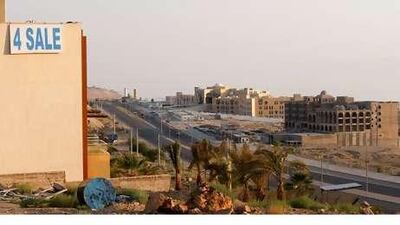It may be called the Dead Sea but its coastline in Jordan is looking very lively. In a major development, the 40km strip will host three new projects worth US$154 million (Dh565.1m). During the next two years, the waterfront will be transformed as investors from Jordan and the rest of the region get to work on the projects.
One of the key developments will be the Hilton Dead Sea Resort and Spa, which will cost 67m Jordanian dinars (Dh347m) to build. Two months ago, Gulf and Jordanian investors announced plans to bring the luxury brand to the country. When completed by the end of 2013, the five-star resort will boast 285 rooms on the shoreline. As well as the Hilton, the Crowne Plaza group is constructing a "five-star palace" with 410 rooms, two swimming pools, four restaurants and a spa with 40 treatment rooms.
There are already five hotels operating on the eastern shore of the Dead Sea, including the four-star Dead Sea Hotel and Spa, the Marriott and a Holiday Inn. But the number of rooms, which today stands at just 1,500, needs to be increased to a minimum of 5,000 to turn the historic coastline into a tourism hotspot. "We need to have nearly 5,000 rooms in order to become a destination," says Saleh Kilani, the chairman of the Dead Sea Development Company (DSDC), which was created by the government last year to bring investors into the region. "The Dead Sea is the largest natural spa and there is room for expansion.
"The number of rooms is limited, while most of the investments are focused on five-star hotels. Now we're looking into diversifying investments. Not all tourists go to five-star hotels and we would like to see different category hotels, just like travel where you have business and economy classes." The eastern shore of the Dead Sea was underdeveloped before the Jordanian government approved a facelift in the wake of a treaty with Israel in 1994. But progress has been slow.
To encourage investments, the government last year declared the area a development zone. It is one of six offering a range of incentives for investors, including a waiver on sales taxes and income tax of just 5 per cent. As the master developer for the area, the DSDC last month signed a 1m dinar deal with the US-based Sasaki Consortium to draw up a blueprint for the shoreline, which will focus on providing infrastructure services.
"We will draw the road map for investments for the future," says Mr Kilani. "There is room for expansion. The more hotels we have, the more customers we will attract. "We also want to ensure that projected investments have an added value, benefit the local community and promote long-term environmental sustainability." So far $64m has been earmarked for the DSDC. "The company signed a major agreement with one investor and is about to sign the other next month," Mr Kilani says.
One of the accords is with Amwaj International, a Jordanian-based property developer. The company, which is owned by Jordanian and Iraqi investors, plans to build a $50m, five-star tourist resort with 250 rooms. Other property companies are also moving in. Al Thuraya, which is based in Amman, is working on a $14m, three-star resort with 100 chalets. The two projects are expected to take two years to complete.
"We are also negotiating agreements with at least three major Arab investors to launch other tourist projects," Mr Kilani says. But this coastline development will be carefully controlled. "Even with the projected expansion, we do not wish to see the area turned into a mass destination site," says Nayef al Fayez, the head of the Jordan Tourism Board (JTB). "So far, we have yet to reach our potential. The Dead Sea can accommodate more hotels with different room categories and more tourists."
Between 2005 and last year, the number of available rooms in the area jumped from 682 to 1,046, according to JTB, while the number of tourists who stayed in the hotels increased from 120,316 to 202,582 during the same period. Figures such as these show the area is ripe for development. Being just a 30-minute drive from Queen Alia International Airport in Amman, the Dead Sea shoreline has a competitive advantage alongside its therapeutic waters.
There is also the King Hussein Bin Talal Convention Centre, which has hosted the World Economic Forum. "There are positive prospects for tourism and investments," says Mr al Fayez. "We have intensified our campaigns in the Arab market to encourage tourists to visit the Dead Sea. It is already paying off, not only from Syria and Lebanon, but also from the Gulf." Despite its proximity to Amman, access to Dead Sea resorts remains a distant dream for many ordinary Jordanians. According to a 2008 report by the USAID Jordan Economic Development Programme, the project plans have focused too heavily on the "high-end" international market and ignored ordinary Jordanian families.
"Many Jordanians cannot afford to spend a weekend there, let alone an entry fee to one of the hotels," says Imad Hmoud, an independent economist. "The existing investments target foreigners and medical tourists from Europe and the Gulf states. "Middle-class Jordanians are not able to access these hotels despite their proximity to the capital because they are too expensive. There is a large segment of society deprived from enjoying the Dead Sea. Therefore, future investment should not neglect these people."
@Email:smaayeh@thenational.ae

